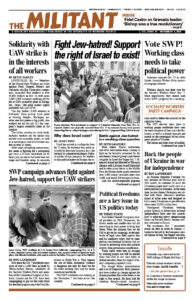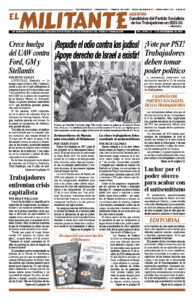As Russian President Vladimir Putin’s invasion of Ukraine goes into its 20th month, he continues to insist the Ukrainian people don’t really exist as a nation and are just Russians. At the same time, he also claims Ukrainians are riddled with Nazis. Moscow’s airstrikes aimed at urban areas and designed to kill as many Ukrainians as possible have taken some 10,000 civilian lives.
Courageous Ukrainian working people fighting to defend their national independence have met this assault. Kyiv is inflicting heavy, demoralizing losses on Russian forces, fueling anti-war sentiment in Russia.
The murderous Oct. 7 antisemitic attack on Jews in Israel by Hamas — backed to the hilt by the bourgeois clerical regime in Iran, the biggest reactionary power in the Middle East — has deepened the moves by capitalist regimes there and worldwide to find new alliances and expand their militaries to defend their national interests.
Tehran backs proxy militias and armies across the region, including Hamas and Palestinian Islamic Jihad in Gaza, and is driving to develop nuclear weapons intent on annihilating the Jews in Israel.
Moscow has become increasingly reliant on drones and other armaments from Tehran as its stores of missiles shrink with its losses in Ukraine.
Hamas and its allies in Tehran and Lebanon look to deepen their efforts to kill all Jews “from the river to the sea” in Israel. But the Kremlin, bogged down and losing ground to the Ukrainians, is less capable of intervening on their behalf. And just like Moscow, Tehran faces growing opposition to its military adventures abroad among the country’s working people and oppressed nationalities.
The difficulties facing Moscow in Ukraine and the depth of the determination of Ukrainian working people to defend their country’s sovereignty were admitted Oct. 5 by Pavel Gubarev, a pro-Moscow leader of the self-proclaimed Donetsk People’s Republic. To win the war, he declared, the Russian military would have to “kill as many people as necessary.”
But since Moscow is incapable of exterminating the Ukrainians or suppressing their resistance, he said Russian forces may have to set up concentration camps to “reeducate” the Ukrainian people.
Moscow’s forces suffer heavy losses
Since Oct. 10 Moscow has mounted sustained assaults against Ukrainian positions in and around the town of Avdiivka, nine miles north of the city of Donetsk, the Russian-occupied capital of the Donetsk province. Putin’s goal is to achieve some kind of victory — whatever the cost — and to force Ukraine to divert troops from its advances in the south. Despite extremely heavy losses, the Kremlin continues to mount wave after wave of failed attacks on Avdiivka.
Hundreds of Russian tanks and other armored vehicles with 10,000 soldiers were thrown against the heavily fortified town. In two weeks Moscow’s forces suffered horrific losses for little gain. According to the Kyiv Post, they lost over 200 tanks and armored vehicles, with some 3,000 troops killed. This has deepened demoralization among surviving conscripts.
In one intercepted phone call, a Russian soldier, weakened by hunger and thirst, tells his wife his unit hasn’t had food delivered for three weeks or water for seven days.
“The assault failed,” he said. “Everything that we occupied, they [Ukrainians] have already recaptured.”
He complains about the army high command’s utter disdain for Russian troops. He describes losing 100 men “in a few days.”
“That’s the whole war,” he said. “The army resembles the country,” where Putin’s war and his efforts to put the cost of it on the backs of Russian working people make conditions worse and stir dissent.
And the disproportionate losses among nonethnic Russians at the front fuel anger against the war and against Moscow’s oppressive domination.
Ukrainian commander Dmytro Lysyuk told the Guardian these human-wave Russian tactics have repeatedly failed. By contrast, he said, Kyiv tries to minimize casualties in its counteroffensive in the south. Its forces shifted from armored assaults to carrying out slow advances by small units making their way through heavy minefields and surprising dug-in Russian forces.
“Humans are our most precious resource,” Lysyuk said. He added, “We are fighting a strong enemy. There will be no quick victory. We shouldn’t be under any illusions.”
In the single worst day of the war for the Russian air force, Kyiv’s forces fired newly supplied long-range missiles, hitting two crucial airfields near the Russian-occupied cities of Berdyansk and Luhansk Oct. 17. Up to 20 military helicopters were damaged beyond repair and as many again put out of action. This weakens Russian air attacks on Ukrainian advances in the south.
Moscow was also forced to withdraw 10 warships — most of its Black Sea Fleet — from the port of Sevastopol in occupied Crimea. Ukrainian missile, drone and commando strikes had severely damaged several Russian warships, the docks and the fleet headquarters, as well as radar installations. This is a serious setback for Putin, whose military seizure of Crimea in 2014 marked the opening shots in his drive to seize and subjugate Ukraine.

